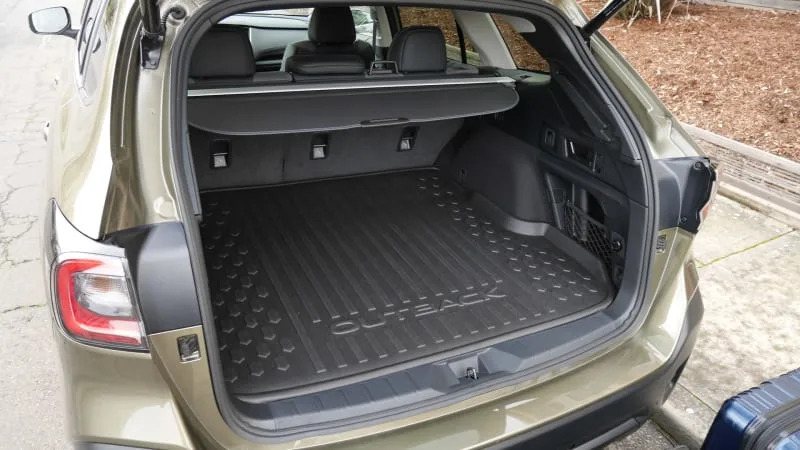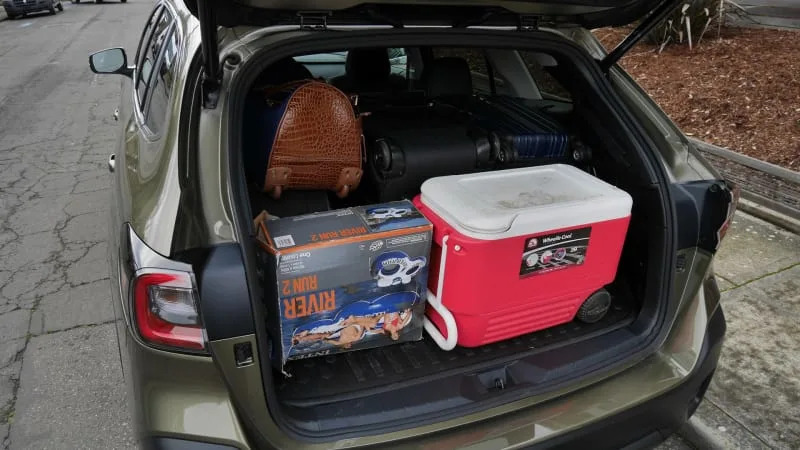Pros: More passenger and cargo space than comparably priced SUVs; big-time ground clearance; low roof with versatile rails; fuel efficient
Cons: Imprecise steering; odd power delivery; Wilderness’ on-road handling and fuel economy
So you want an SUV, eh? Something that offers ample space, cargo-carrying versatility, standard all-wheel drive and extra ground clearance for … well, something will probably come up. Having a rugged look and vibe would be nice, too. Well, allow us to recommend a wagon instead, the 2024 Subaru Outback, which in many ways is a more capable SUV than most SUVs. It does more than just check the above boxes, it actually outdoes the space, versatility and ground clearance of various similarly priced crossover SUVs, while boasting wagon-specific advantages such as better fuel economy, a more refined ride and a lower roof that makes it easier to load things (and yourself) up on to the lid.
Basically, the Outback remains a great choice for those who actually intend to take their outdoor adventure vehicle on outdoor adventures. There’s a reason Outbacks are everywhere in the Pacific Northwest, New England, Colorado and Alaska. Indeed, seeing one without some sort of accessory rack on top is rare in those places. Things can even get more rugged with the Outback Wilderness version.
All told, the Outback makes a ton of sense, but it certainly won’t be for everyone. Base engine acceleration leaves much to be desired, and the numb steering does not breed much confidence. Technology is hardly it’s forte, either, and in terms of aesthetics, the Outback is far closer to the ugly end of the spectrum than the attractive one. So, it won’t be for everyone, but we think everyone looking at comparably priced SUVs would be wise to at least consider it.
Interior & Technology | Passenger & Cargo Space | Performance & Fuel Economy
What it’s like to drive | Pricing & Trim Levels | Crash Ratings & Safety Features
What’s new for 2024?
The Wilderness gets a new, supposedly more rugged-looking front fascia. You can see the difference above, with the new version on the left. The rest of the design carries over. All other Outbacks look the same as they did last year, which saw a more comprehensive (and arguably ugly) styling refresh. There are some equipment updates for 2024, though. The Onyx Editions and Wilderness now include the heated steering wheel previously found only on upper trims, while the base engine Onyx Edition now includes a sunroof and reverse automatic braking like its turbocharged counterpart.
What are the Outback interior and in-car technology like?
Nearly every 2024 Outback comes with a vertically oriented 11.6-inch touchscreen. It’s easy to reach and read, but it looks and to a lesser extent operates a bit rudimentary compared to what you’d find in other brands’ vehicles. The base Outback’s system, which consists of two 7-inch screens, is bizarre in appearance and concept, but is similarly easy to use.
In terms of design, we can’t say the interior is especially attractive, but materials quality is stronger than it was in the past. The buttons and switches have a high-quality feel to them, while even the base trim gets simulated leather stitched together on the dash, doors and center console. There’s also a welcome injection of color found in the Onyx Edition (gray and black “StarTex” vinyl accented in electric green), the Wilderness (textured “StarTex” upholstery with bronze accents throughout, shown above) and the range-topping Touring (tasteful brown leather). The Wilderness also gets special all-weather floor mats with emblems and mountains embossed on them.
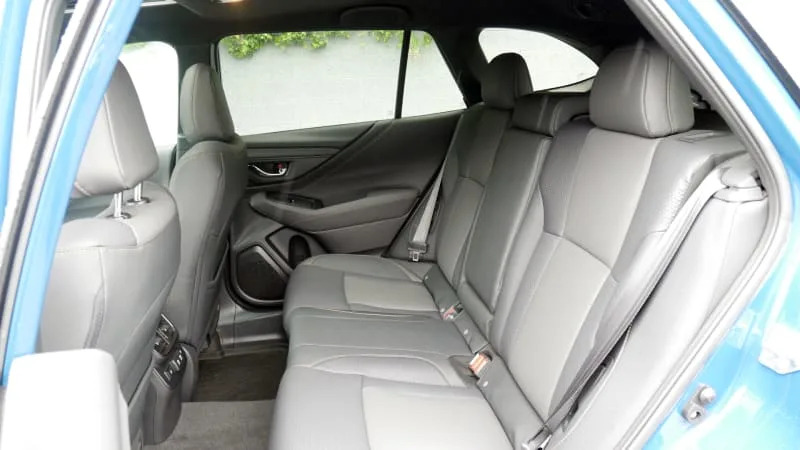
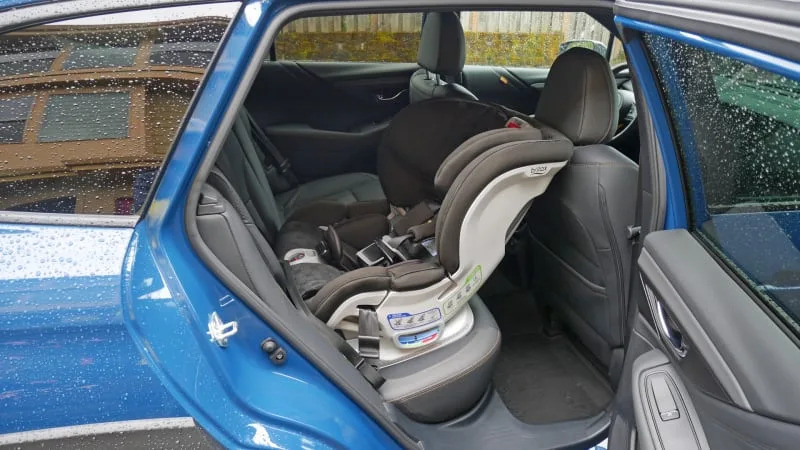
How big is the Outback?
Think a wagon is smaller than an SUV? Think again. With its substantially longer wheelbase and overall length, the Outback exceeds the space you’ll find in compact crossovers like the Honda CR-V, Toyota RAV4 and Subaru’s own Forester. This is especially noteworthy for parents with rear-facing child seats (see our Outback car seat space test here).
Cargo volume, meanwhile, is exceptional. True, it’s a bit less with the back seat raised (32.5 cubic feet) than some larger compact crossovers (RAV4, Tucson, Sportage), but their numbers are a bit deceiving since so much of an SUV’s space is up high in the greenhouse where filling it can block rear visibility and pose a danger due to items flying forward. The Outback’s space, by contrast, is more reliant on its generous width and depth. Its maximum cargo capacity with the seats down also provides greater length, countering the extra height of SUV competitors. In our experience, this makes the Outback more useful overall.
Even better, most versions of the Outback includes unique roof rails that swing inward to become their own crossbars (pictured below). There are also sturdy tie-down points front and back, and since the Outback’s roof is lower than an SUV’s, it’s easier to load stuff up there (including yourself in a roof-top tent). The downside to these roof rails is that they have a lower weight capacity than the fixed rails of other Subarus and limited crossbar placement. As the most hardcore Outback, the Wilderness therefore has stronger, fixed roof rails (below, bottom left) to meet more demanding needs.
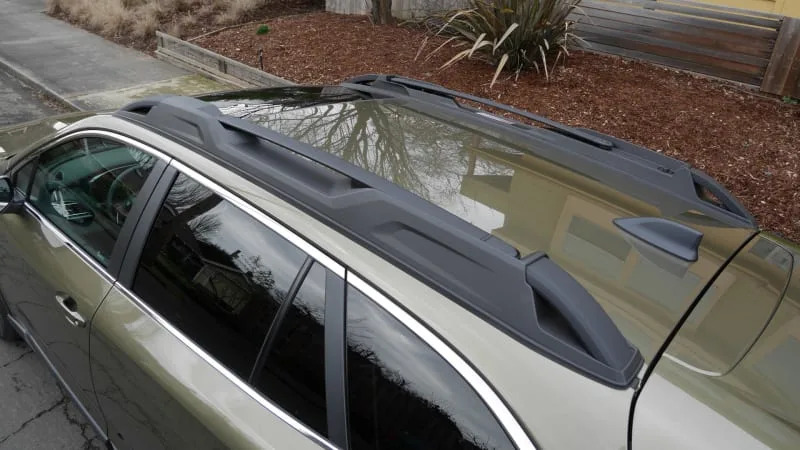
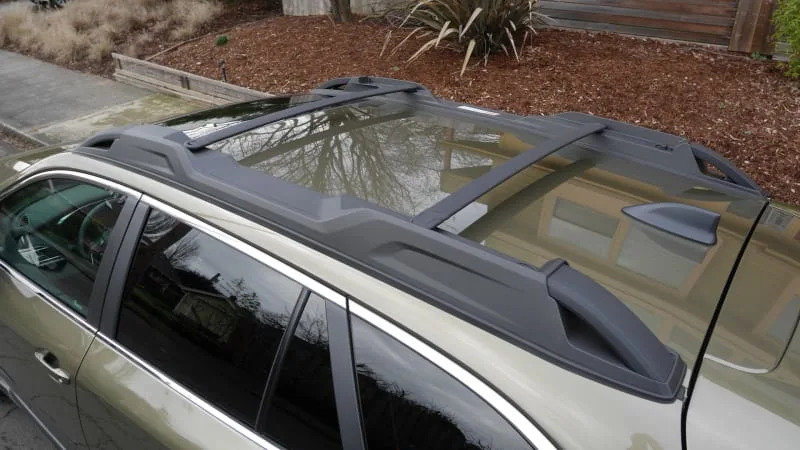
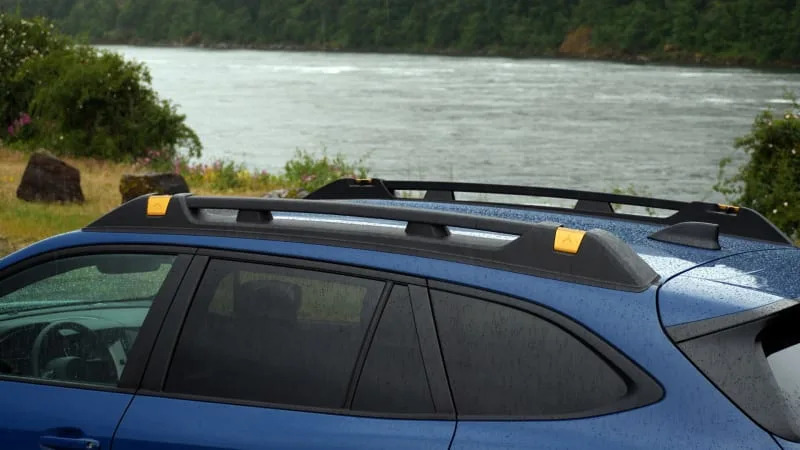
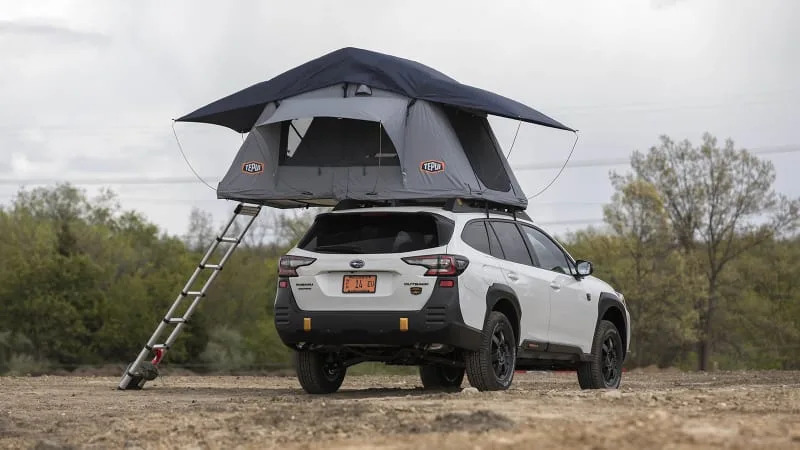
What are the Outback fuel economy and performance specs?
The Outback comes standard with a 2.5-liter horizontally opposed “Boxer” four-cylinder that produces 182 horsepower and 176 pound-feet of torque. This amount is mid-pack when compared to most compact crossovers. Midsize crossovers like the Honda Passport have far more standard power, but also get worse fuel economy. The base Outback engine returns 26 mpg city, 32 mpg highway and 28 mpg combined, which is excellent considering every Outback comes standard with all-wheel drive. A continuously variable transmission (CVT) is also obligatory.
The upgrade engine is designated by the name XT and is optional on the Limited, Onyx Edition and Touring trim levels. It’s standard on the Wilderness. This turbocharged 2.4-liter boxer-four produces 260 hp and 277 lb-ft of torque, which is a far more compelling output. It’s definitely a box to check if you plan on putting all that space to good use and especially if it’ll happen at altitude, where naturally aspirated engines lose power. Fuel economy can still be quite good with an estimate of 22 mpg city, 29 mpg highway and 25 mpg combined. The Wilderness takes a significant hit due to its higher ride height and all-terrain tires with estimates of 21/26/23.
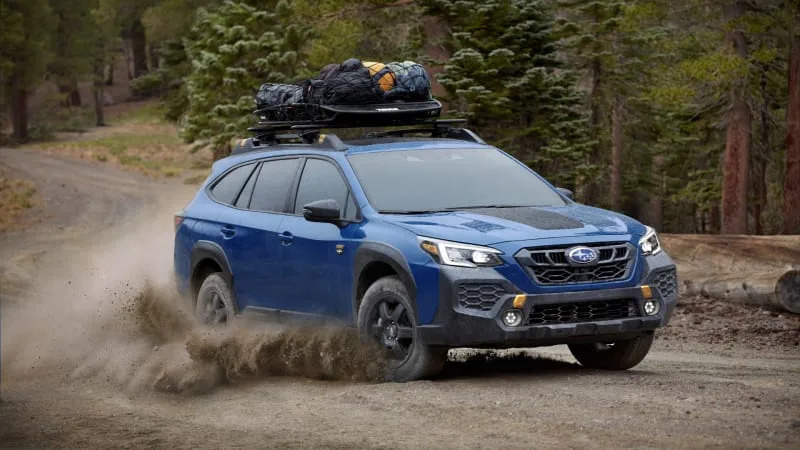
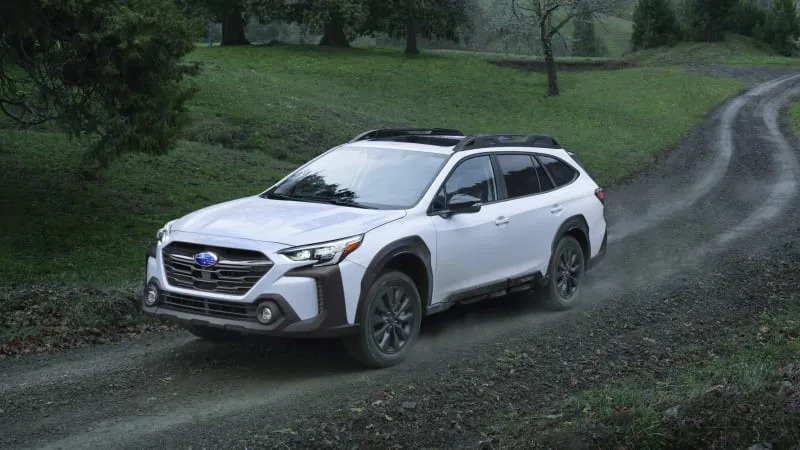
What’s the Outback like to drive?
The Outback’s steering is quite numb on center, which doesn’t promote a sense of driver-machine control. It’s easy to turn at low speeds, and actually well-suited to loose off-road surfaces, but for those hoping a wagon will be more involving to drive than a small SUV, the steering is a real letdown. And it actually gets worse. The Wilderness (above left) has Yokohama Geolander all-terrain tires, which look cool and are certainly beneficial off-road, but on-road they create a squishy, delayed response off center (as is typical for all-terrain tires) and significantly reduce grip on pavement. The amount of slide we experienced in a damp hairpin turn was almost comical. Interestingly, we did not experience the same response issues in the Forester Wilderness, which has the same tires, though a different suspension and more responsive steering tuning.
As for the Outback Wilderness suspension, the ride is acceptably firmer than the notably soft tuning you’ll find in other Outbacks. We didn’t notice a degradation in handling due to the lift, but that’s because the tires didn’t really give us the opportunity to push the thing. No Outback is ultimately much of a handler. At the same time, though, you can tell that it’s lower and wider than the small SUVs it’s bound to be compared with. That’s a good thing for those of us who prefer the feel of driving a car and being a bit lower to the ground (even if the Outback has more ground clearance than most SUVs at 8.7 standard or an almost-absurd 9.5 for the Wilderness). Its longer wheelbase also helps provide a smoother, more composed ride.
The base engine provides sufficient power, and the CVT helps keep revs relaxingly low at dawdling, around-town speeds. Push it, however, and this engine quickly loses steam and wails as the CVT does its best to keep revs beneficially high. Though it attempts to create a more traditional driving feel by simulating upshifts, it does so at unusual times that don’t exactly eliminate the unusual feel and sound of a CVT. These attributes remain in the turbocharged XT, but are at least mitigated by the more powerful engine that doesn’t have to work as hard. That said, the turbo engine is also a bit old-school in its power delivery. It feels pretty pokey and slow until about 3,000 rpm, and then bam, the turbo kicks in. We’re guessing this is more the result of promoting good fuel economy by limiting boost at low rpm rather than old-fashioned 1980s turbo lag.
What other Subaru Outback reviews can I read?
2022 Subaru Outback Wilderness First Drive
The full scoop on the Outback Wilderness with more detailed information about its special features and what it’s like to drive.
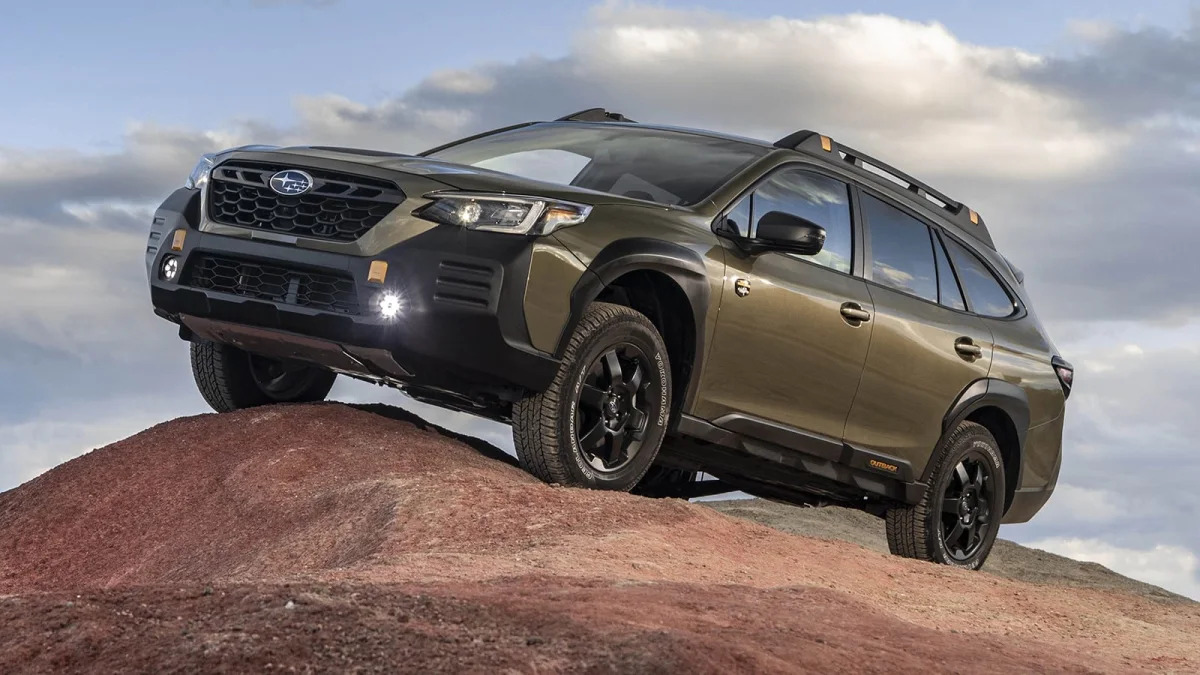
Comparison Test: 2020 Subaru Outback vs 2020 Subaru Forester
Subaru uniquely sells two similarly sized crossovers: one more wagon-like, the other more SUV-like. We test them side-by-side.
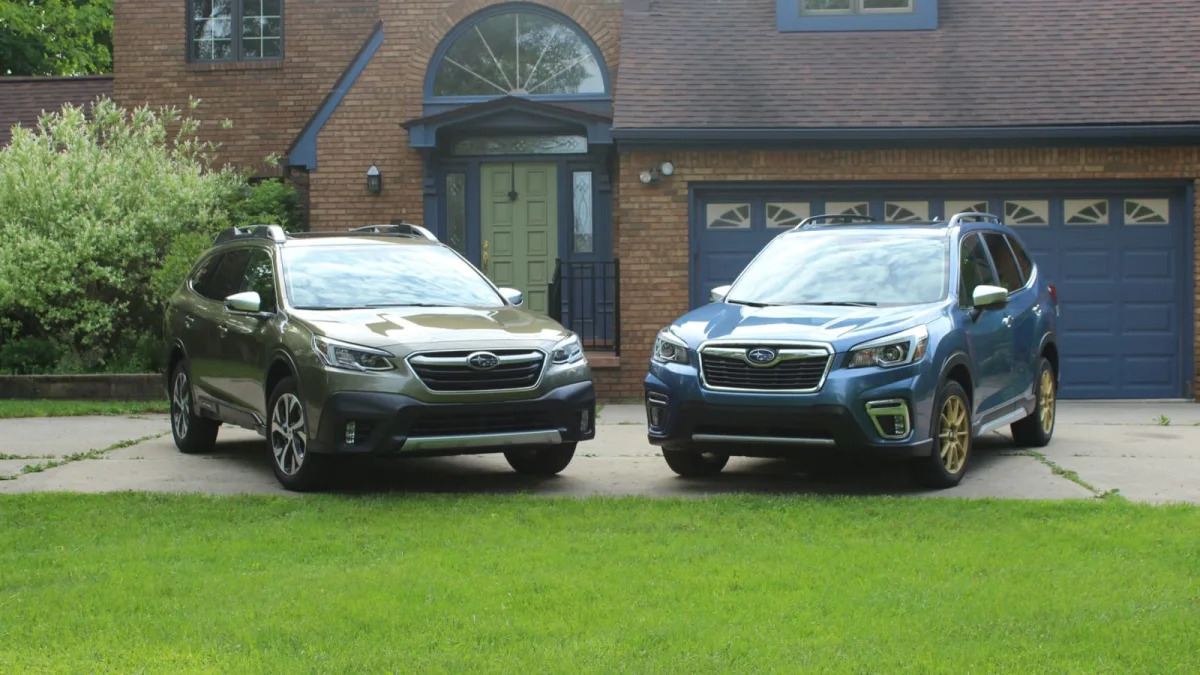
2020 Subaru Outback Roof Rack Driveway Test
We test the Outback’s unique roof rails that become their own crossbars using the new Yakima CBX Solar.
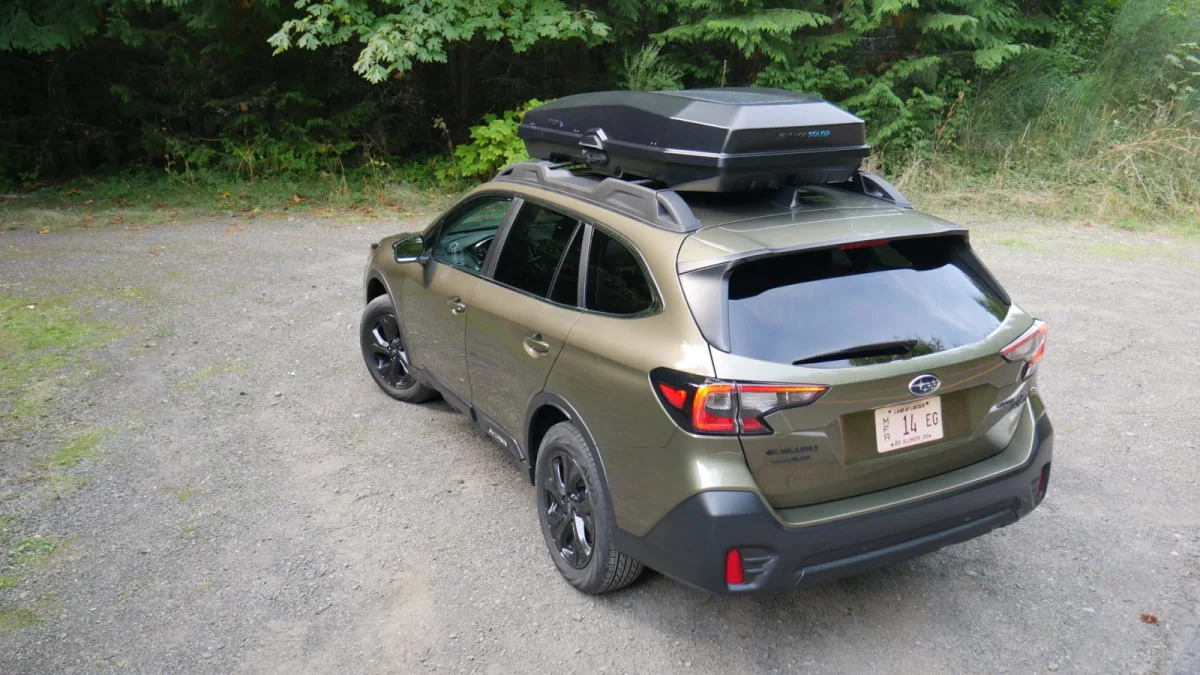
2020 Subaru Outback Luggage Test | Score one for wagons
We take a deep dive into the Outback’s cargo capacity in this luggage test, finding out how much stuff fits in the cargo area.
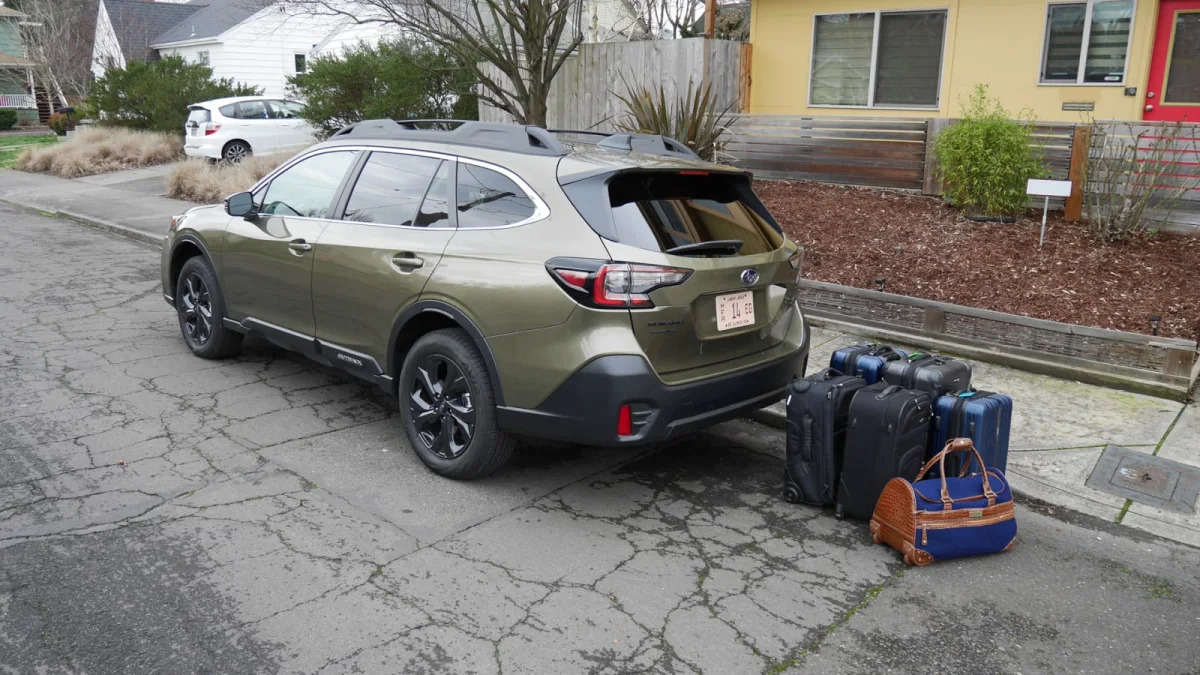
2020 Subaru Outback Suspension Deep Dive
Our contributing engineer Dan Edmunds takes you underneath the new Outback to explain why it’s better to drive than the previous generation and how it differs from the Legacy.
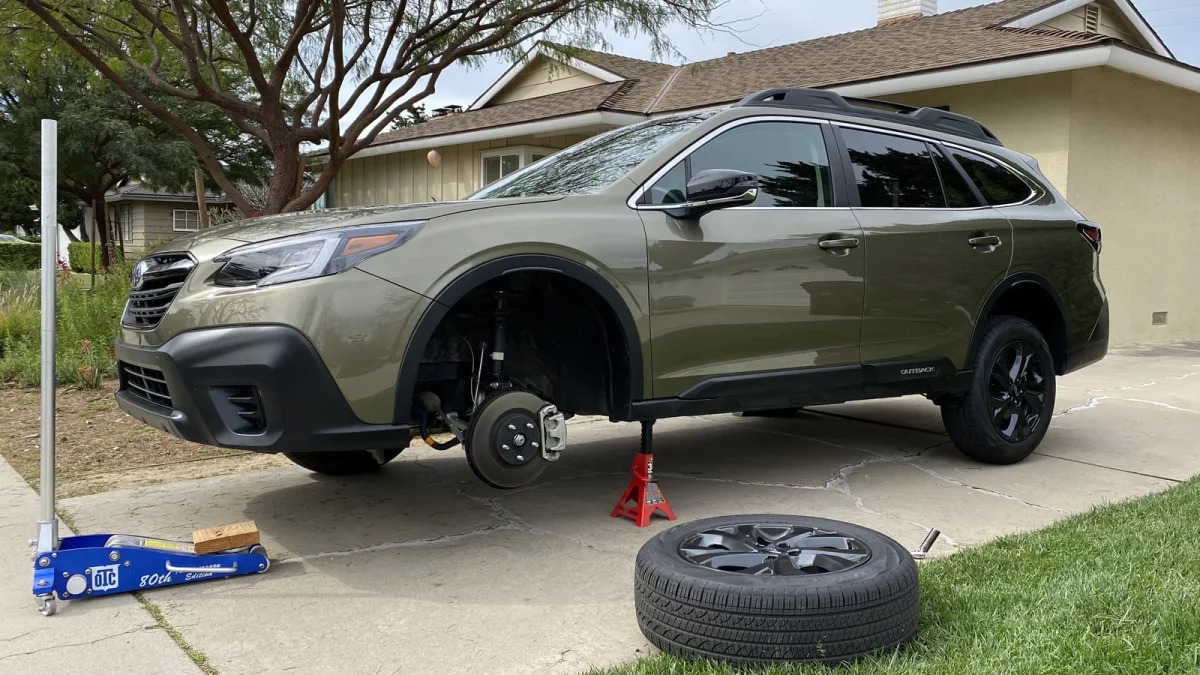
2022 Subaru Outback Car Seat Space Test
How much does the Outback back seat have for a giant rear-facing car seat, and importantly, how much is left over for mom and dad up front? This provides the answers.

2020 Subaru Outback First Drive | The big payoff
Our first drive review of the new Outback, including more information about what’s new and its revised design and engineering.
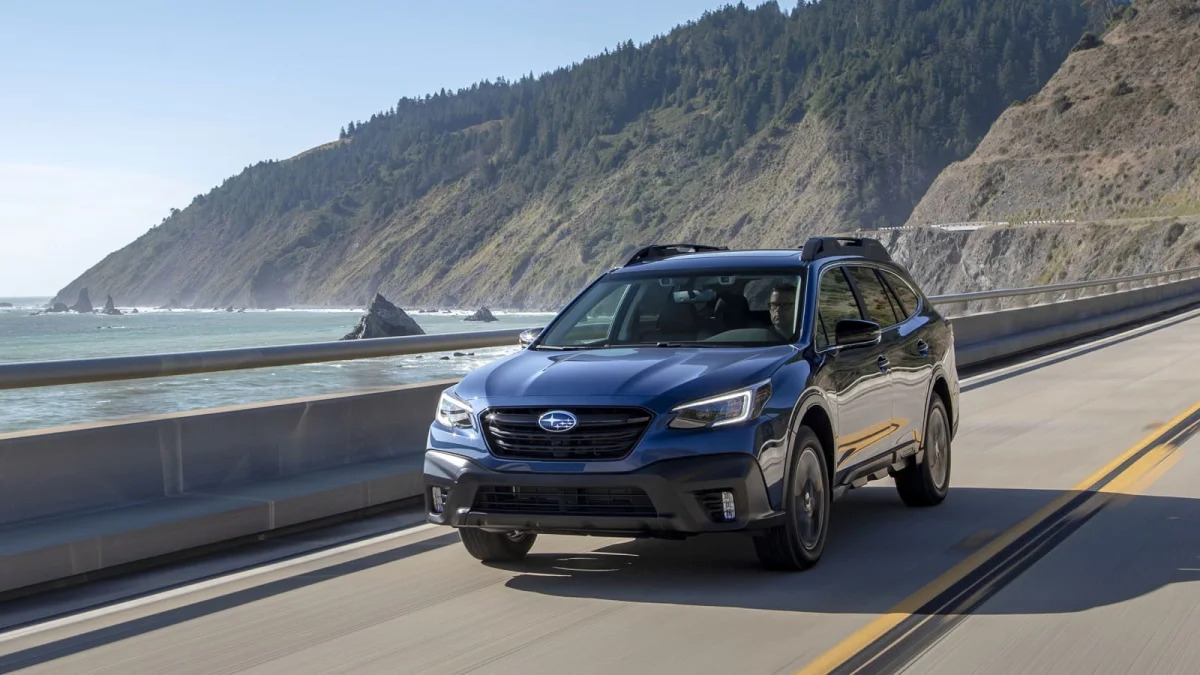
2020 Subaru Outback 2.5 base engine review
We sample the new Outback with its base engine in the top-of-the-line Touring trim level.
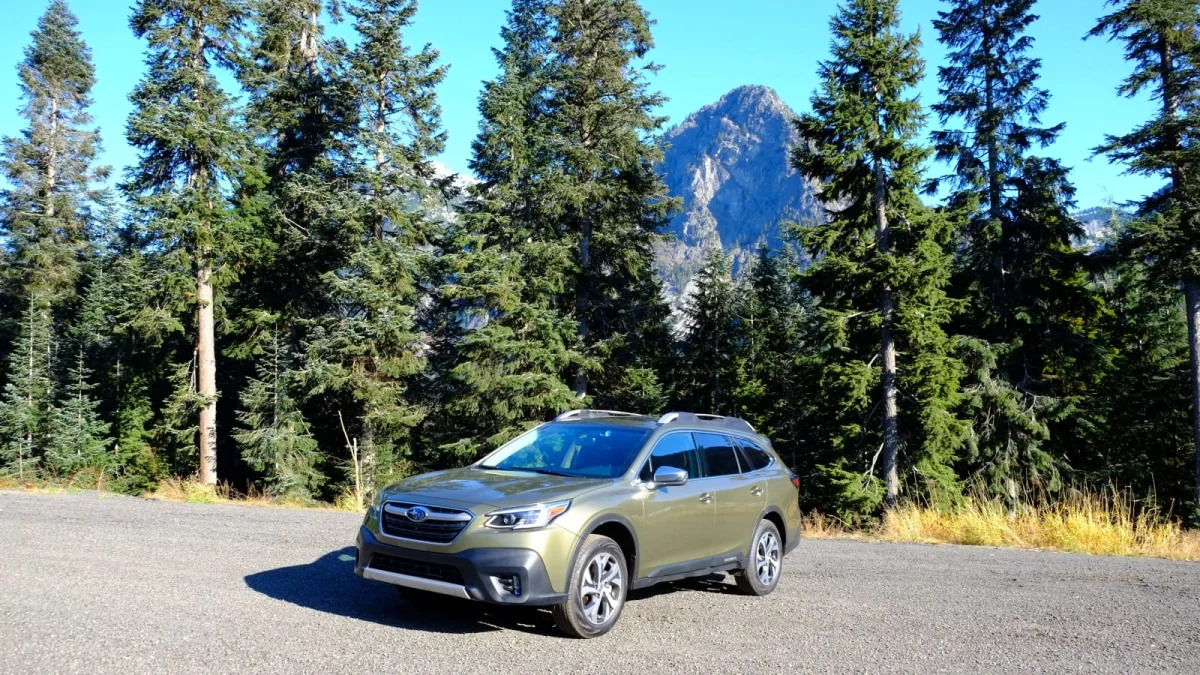
What is the 2024 Outback price?
Standard equipment is generous for the Indiana-built Outback. Besides the abundant safety tech described in the section below, you get allow wheels, steering adaptive LED headlights, fog lights, automatic climate control, a rearview camera washer, roof rails with integrated tie-downs and crossbars, two 7-inch touchscreens, Apple CarPlay, Android Auto, satellite radio and a four-speaker sound system.
As is usually the case, stepping up to the second trim level rung is a good idea. For an extra $2,250, the Outback Premium extras include a power driver seat, heated front seats, a leather-wrapped wheel, dual-zone climate control, rear air vents, a cargo cover, the vertically oriented 11.6-inch touchscreen, two rear USB ports and six speakers.
As we see it, the main reason to step up to the upper trim levels is to gain access to the XT turbo engine upgrade. Among those, we think the Onyx Edition is the one to get, mostly because its water-repellant “StarTex” vinyl upholstery will wear better and is easy to clean (and it’s cow free). As for the Wilderness, its compromised on-road handling would give us serious pause, but we can’t deny the appeal of its special looks and increased capability. It adds 0.8 inch of ground clearance, Yokohama Geolander all-terrain tires, special black wheels, a matching full-size spare, ladder-type fixed roof rails, hexagonal LED foglights, different bumpers and fender flares, bronze color accents inside and out, and special X-Mode calibration.
All prices below include the $1,295 mandatory destination charge.
Base: $30,190
Premium: $32,490
Onyx Edition: $37,400
Limited: $37,090
Touring: $41,640
Onyx Edition XT: $40,655
Wilderness: $41,255 (pictured below right)
Limited XT: $41,490 (pictured below left)
Touring XT: $44,090
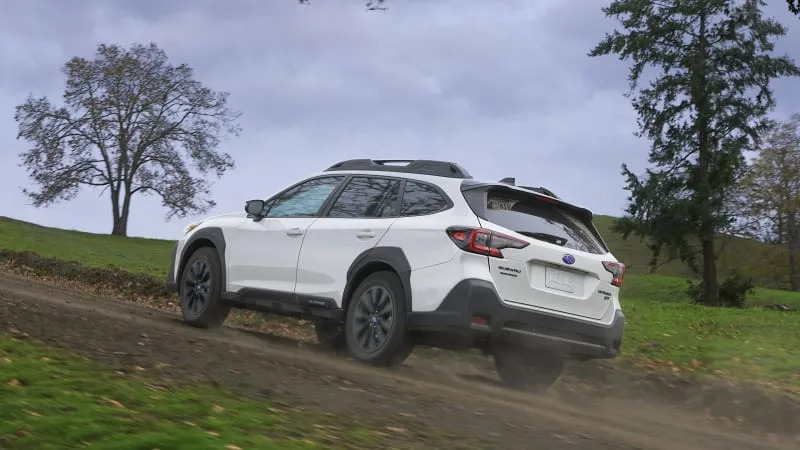
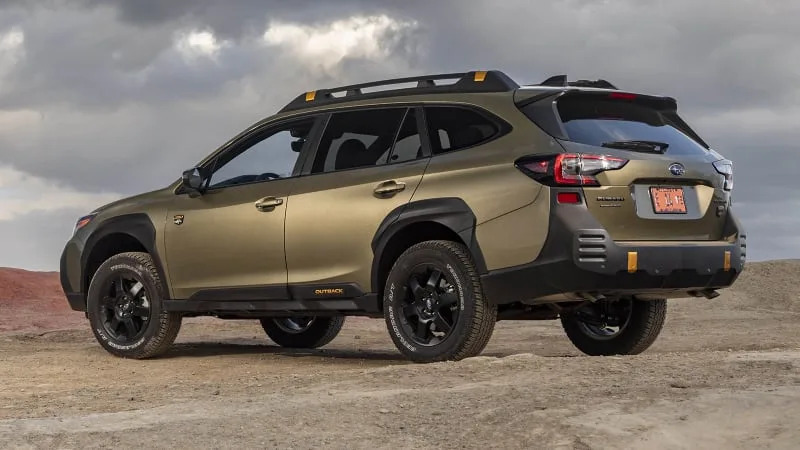
What are the Outback safety ratings and driver assistance features?
Every 2024 Outback includes forward collision warning with pedestrian detection and automatic emergency braking, lane-departure warning, lane-keeping assist, a rear seat occupant reminder and adaptive cruise control with lane-centering steering. Blind-spot and rear cross-traffic alert are optional on the base trim and standard on all others. The DriverFocus distraction mitigation system is optional on the Limited and standard on the Touring. The Touring also gets an extra camera that enhances the pedestrian and cyclist detection of the forward collision warning/prevention system.
These systems all accomplish the task of keeping you safe, which is the point. However, they are also a bit over-eager and vocal about their warnings – there’s an awful lot of beeping and blinking lights. Comparable systems of rival brands tend to do the same jobs with less annoyance.
Government crash ratings are a perfect five stars across the board. The Insurance Institute for Highway Safety also named it a Top Safety Pick for its best-possible crash protection and prevention ratings. Its headlight ratings were also better than most and its LATCH child seat anchors received the best-possible “Good+” rating (part of that is the fact the Outback has a rare middle LATCH anchor).

